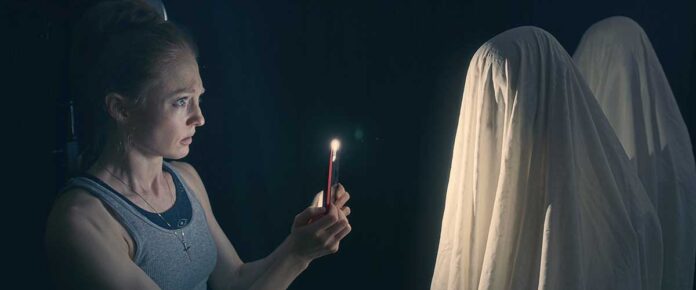“Alone with You” is an ambitious thriller available on demand February 8 about Charlie (Emily Bennett, who cowrote and codirected with Justin Brooks) who is waiting for her girlfriend Simone (Emma Myles) in their Brooklyn apartment.
Charlie is planning a nice romantic dinner, but from the start, things feel off. First, she spills a glass of wine in the bath — a bad sign. Then she gets a call from her friend Thea (Dora Madison) who warns her to watch her back; that Simone is sadistic. And when Charlie’s mother (Barbara Crampton) messages her urgently for a video call, not only does Charlie learn her grandmother has passed, but that her attendance is not required at the funeral. Charlie’s devout mother expresses disapproval about her daughter’s sexuality, even referring to Simone as her daughter’s “roommate,” which makes Charlie bristle.
This setup is certainly ominous, as is the film’s deliberately convoluted opening sequence that appears to be a flashback to the couple’s past — which may not have always been rosy. But trouble really ensues when Charlie realizes she is trapped in her apartment. The door is stuck (as has happened in the past; she leaves a message for the landlord) and the windows are covered by a tarp or something that blocks out the light. Charlie also cannot reach Simone on her phone, which is frustrating. But what is really peculiar is that none of Charlie’s clocks are showing the time. Has Charlie entered into a strange state of limbo? She asks both her mother and Thea at different times if it is day or night outside. Even her 911 calls for help are fraught; Charlie believes she has reached a recording.
Adding to her fears, the lights flicker, there are footsteps that may be coming from above, shadowy figures are lurking outside her door, and someone crying through the vent. There is also periodic knocking. (There is, actually, a very good thriller from Sweden entitled, “Knocking,” about a lesbian haunted in her apartment, which “Alone with You” at times resembles. Other viewers may catch references to the classic “Repulsion.”)
Bennett and Brooks obviously made this film during the pandemic, setting it almost entirely within the confines of Charlie’s apartment. The minimalist approach allows for some nifty camerawork — tracking Charlie as she goes from room to room, pulling back as Charlie is trapped at a window to illustrate her isolation, or shooting scenes through the vent in the wall, or with just the light from a cell phone. The strong visuals certainly help create a claustrophobic mood and atmosphere, especially when Charlie is surrounded by a bunch of sheet-covered mannequins Simone collected for a photo shoot in one unsettling sequence.
But the filmmakers try too hard to create meaning out of symbols like a cross necklace, a trunk, decayed flowers, and whatever the bloody mess is in the fridge. And the editing can at times be confusing. Charlie may be an unreliable narrator, and this whole film may be a dream (or a nightmare), but viewers may give up trying to piece things together as “Alone with You” lumbers along to its ambiguous conclusion.
There are flashbacks to some exchanges between Charlie and Simone that suggest Charlie is too codependent, suffocating Simone in their relationship. And there are hints that Charlie is jealous that Simone is seeing other people. The film suggests Charlie’s excessive, obsessive love for her girlfriend is why she is descending into madness (if that is what is happening) — and it is troubling to associate her romantic love to mental illness. There is one tender moment, where Simone photographs Charlie nude, that provides a sense of intimacy between these women. In contrast, a fight they have outside their apartment reveals how sour things are between them.
Bennett’s performance is a showcase for her to emote wildly, and while she shows her range as an actress by experiencing big emotions, she fails to make Charlie a sympathetic character. Her early exchange with her mother shows her vulnerability in a way that invites pity, but she is less likeable in her flashback scenes with Simone, or even her calls with Thea. And as Charlie’s situation grows increasingly more desperate, and she is screaming and crying for help, it becomes painful to watch — just not in the way the filmmakers intended. “Alone with You” may make viewers feel they are trapped in the apartment with Charlie, but at least there is an option to leave.
Given the emphasis on psychological horror, the film features only one real jump scare, but it may only alleviate some of the boredom. The filmmakers create a series of surreal moments that leads up to a “shocking” denouement that is more likely to generate a shrug than any real enlightenment.
Despite its noble efforts, “Alone with You” fails to deliver on its potential.
